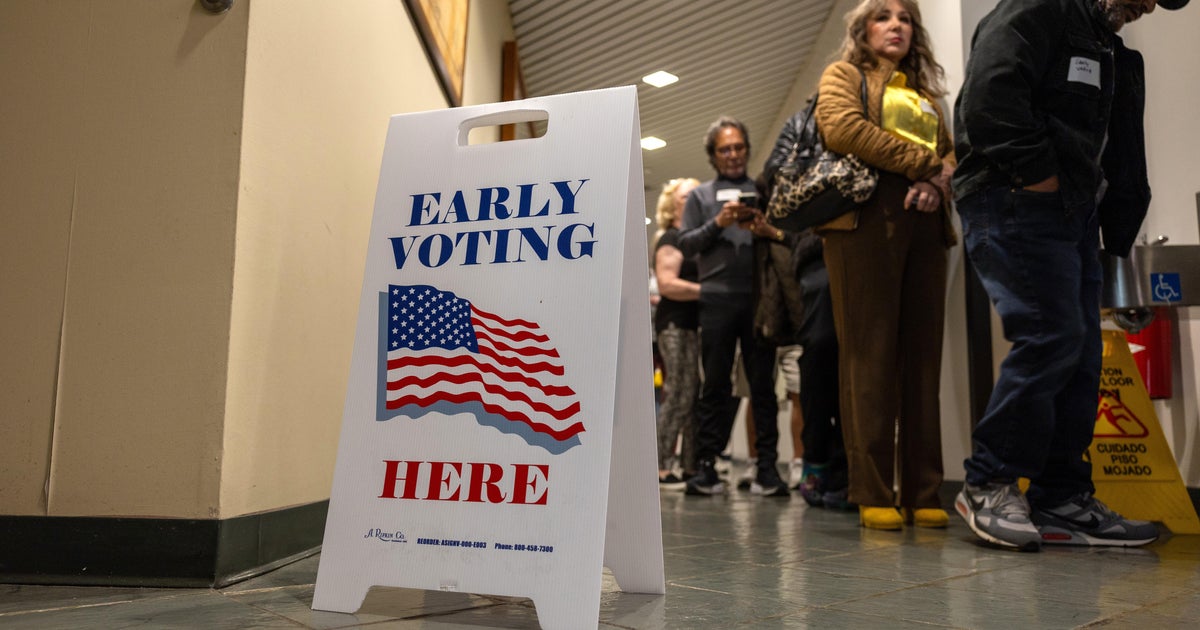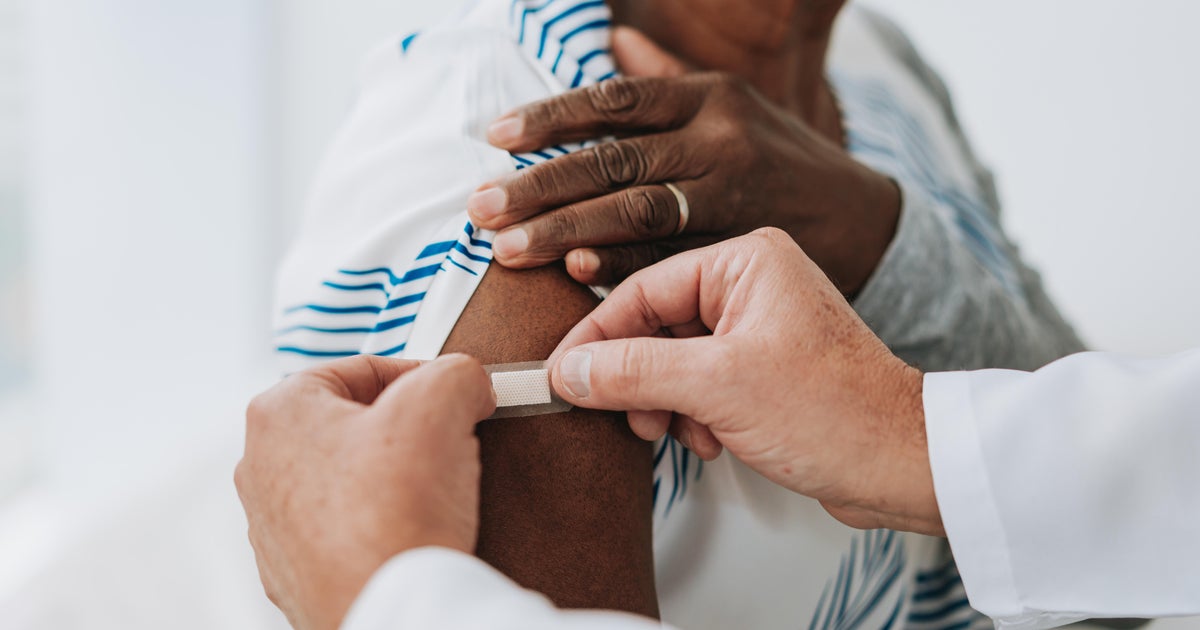CBS News
Early voting for 2024 election underway in dozens of states with 28 million ballots cast so far

Washington — With early voting underway in all seven battleground states and in another three dozen states, millions of Americans have cast their ballots already.
More than 28 million people have voted early so far, according to data from the University of Florida’s Election Lab, with the most voting by mail. Democrats are outpacing Republicans in casting their ballots early, data from 25 states that report party registration shows.
More Republicans have cast roughly 327,000 more ballots in person so far, while more Democrats have returned 1.3 million more mail ballots than registered GOP voters, according to the Election Lab.
Record number of ballots cast in some states
The high numbers of voters casting their ballots before Election Day on Nov. 5 has set records in at least two battleground states, North Carolina and Georgia. In Georgia, which President Biden won in 2020, more than 25% of active voters have already cast their ballots, according to Gabe Sterling, chief operating officer for secretary of state.
And in North Carolina, where the western part of the state was devastated by Hurricane Helene, more than 353,000 people voted on the first day of the state’s early-voting period, which was Oct. 17. That figure surpassed the prior record for the opening day of early voting: more than 348,000 in 2020, according to the North Carolina State Board of Elections.
Both surpassed the mark of 2 million votes cast Wednesday. Early voting in Georgia lasts until Nov. 1, and in-person early voting runs until Nov. 2 in North Carolina.
In Nevada, another battleground state, more than 397,000 voters had cast ballots as of Tuesday, with 40% from registered Republicans, according to the secretary of state.
David Becker, a CBS News election law contributor and the executive director of the Center for Election Innovation and Research, cautioned that the breakdown of early voting by party does not portend the outcome of the election.
States report party registration data, and a voters’ political affiliation may not correspond with the candidate who won their vote.
“We won’t know until the votes get counted,” Becker said.
Still, he said that the more early voting there is, the better it is for election administration and security. Those who have already cast their ballots no longer risk standing in long lines on Election Day or getting to their polling place after it’s closed, and they won’t be subject to disinformation that could impact their vote.
2020 early voting
During the 2020 election, nearly 60 million people cast a ballot by Oct. 25, according to the U.S. Elections Project, run by Michael McDonald, a political science professor at the University of Florida who also runs the Election Lab. Democrats doubled the number of Republicans who returned mail ballots by that point in early voting, while Republicans had a slight edge over their Democratic counterparts in voting early in-person.
But 2020 was a “unicorn election,” Becker said, as the COVID-19 pandemic led to higher numbers of people voting by mail and states sought to make it easier for them to do so. And former President Donald Trump spent the months leading up to the last presidential contest falsely claiming that mail-in voting was fraudulent, “corrupt” and “horrible.”
Still, in the years before the 2020 contest, more and more states were offering voters the chance to vote early, either by mail or in person. In the 2000 general election, 24 states had early-voting options, and that number jumped to 28 in the 2008 election, and 31 states and the District of Columbia by 2016, according to an analysis from the Center for Election Innovation and research. For the 2024 election, 47 states give voters ways to cast ballots before Election Day.
And over the last five election cycles before 2020, the share of ballots cast early steadily rose: from 14% in 2000, to 21% in 2004, 31% in 2008, 33% in 2012 and 40% in 2016, the Center for Election Innovation and Research found.
Trump’s shift on early voting
While Trump has for this year’s presidential election continued his crusade against mail-in and early voting at times, he has urged supporters to cast their ballots early in other instances. During a Pennsylvania rally in September, he called the ability to vote before the election “stupid” and claimed it invited fraud.
But in a radio interview with Fox News host Brian Kilmeade that aired Wednesday, he urged his supporters to cast their ballots early and even suggested he would do the same in Florida.
“I have the old standard of the Tuesday vote and all. A lot of people like to vote, and I really miss you know, the main thing to me is you’ve got to vote. You got to vote,” he said. “Voting early, I guess, would be good. But you know, people — I’ll have different feelings about it. But the main thing is you got to get out. You got to vote. And I’ll be voting early. I’ll be running early.”
In a June video for the Republican National Committee, Trump said GOP voters must use “every appropriate tool available” to beat Democrats, whether early, absentee, by mail or in-person.
The RNC has been working to encourage voters to bank their votes by voting as early as possible through absentee voting, in-person voting and ballot harvesting where it’s allowed.
“We want you to bank your vote. We don’t want you to have to worry about waiting in super long lines on Election Day,” Lara Trump, co-chair of the Republican National Committee and the former president’s daughter-in-law, said during an interview Sunday with Fox News.
CBS News
Qatar, Hamas engage for cease-fire talks, Israel’s Mossad chief headed to Doha

Watch CBS News
Be the first to know
Get browser notifications for breaking news, live events, and exclusive reporting.
CBS News
Second dose of this year’s COVID vaccine recommended for some people age 65 and up

Immunocompromised people who are age 65 or older should get a second dose of the 2024-2025 COVID-19 vaccine, according to the latest recommendations from the Centers for Disease Control and Prevention.
In a statement released Wednesday, the CDC said the second dose should be received six months after the first dose.
The CDC also said its recommendations allow for flexibility for those who are moderately or severely immunocompromised to consider additional doses (three or more). in consultation with their health care provider.
In August, the Food and Drug Administration greenlit updated COVID-19 vaccines from Pfizer and Moderna for the 2024 fall season. The updated shots were revised to target the KP.2 variant of SARS-CoV-2, the virus that causes COVID-19, and medical experts say it will also provide protection against other recent strains.
This was part of a now-annual process undertaken by the FDA and health authorities around the world to update the vaccines to protect against newer strains of the virus.
Similar to previous seasons, the Centers for Disease Control and Prevention recommends that all Americans ages 6 months and older get a shot of the updated 2024-2025 COVID-19 vaccine to protect against another expected surge of the virus this fall and winter.
Still, as another fall virus season approaches, not everyone is following the CDC’s advice. According to a survey from Ohio State Wexner Medical Center last month, less than half of Americans were planning to get their COVID or flu shots this season.
“Data continues to confirm the importance of vaccination to protect those most at risk for severe outcomes of COVID-19,” the CDC noted in the latest release. “Receiving recommended 2024-2025 COVID-19 vaccines can restore and enhance protection against the virus variants currently responsible for most infections and hospitalizations in the United States.”
The CDC also reminded the public that the COVID-19 vaccine can help reduce the chances of suffering the effects of long COVID.
contributed to this report.
CBS News
Second dose of this year’s COVID vaccine recommended for some people age 65 and up

Immunocompromised people who are age 65 or older should get a second dose of the 2024-2025 COVID-19 vaccine, according to the latest recommendations from the Centers for Disease Control and Prevention.
In a statement released Wednesday, the CDC said the second dose should be received six months after the first dose.
The CDC also said its recommendations allow for flexibility for those who are moderately or severely immunocompromised to consider additional doses (three or more). in consultation with their health care provider.
In August, the Food and Drug Administration greenlit updated COVID-19 vaccines from Pfizer and Moderna for the 2024 fall season. The updated shots were revised to target the KP.2 variant of SARS-CoV-2, the virus that causes COVID-19, and medical experts say it will also provide protection against other recent strains.
This was part of a now-annual process undertaken by the FDA and health authorities around the world to update the vaccines to protect against newer strains of the virus.
Similar to previous seasons, the Centers for Disease Control and Prevention recommends that all Americans ages 6 months and older get a shot of the updated 2024-2025 COVID-19 vaccine to protect against another expected surge of the virus this fall and winter.
Still, as another fall virus season approaches, not everyone is following the CDC’s advice. According to a survey from Ohio State Wexner Medical Center last month, less than half of Americans were planning to get their COVID or flu shots this season.
“Data continues to confirm the importance of vaccination to protect those most at risk for severe outcomes of COVID-19,” the CDC noted in the latest release. “Receiving recommended 2024-2025 COVID-19 vaccines can restore and enhance protection against the virus variants currently responsible for most infections and hospitalizations in the United States.”
The CDC also reminded the public that the COVID-19 vaccine can help reduce the chances of suffering the effects of long COVID.
contributed to this report.


